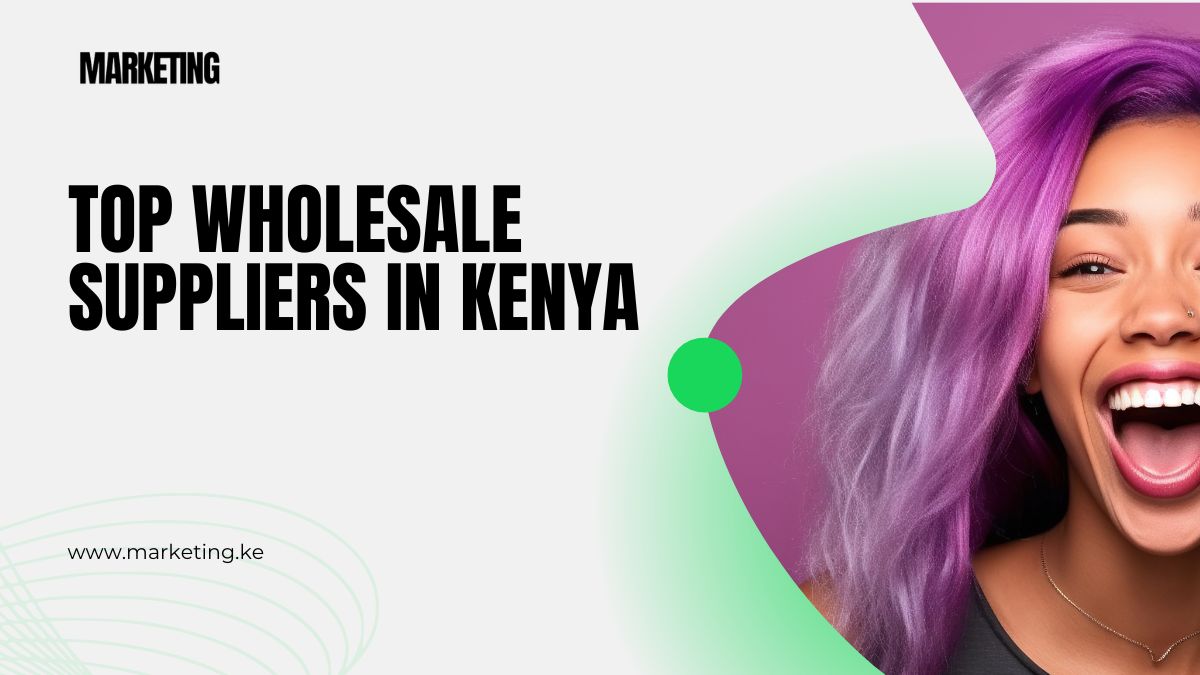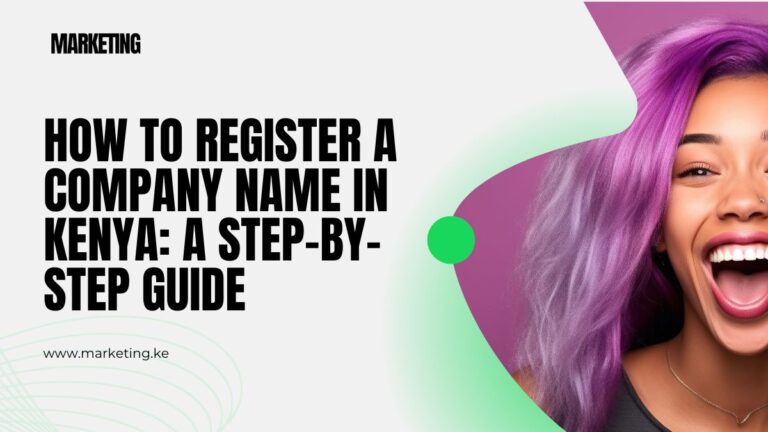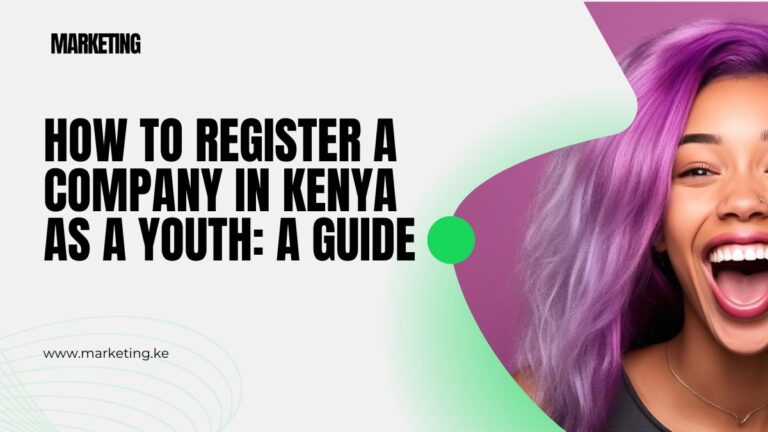Top Wholesale Suppliers in Kenya
Last updated on June 16th, 2024 at 11:18 am
In our last post, we talked about wholesale business in Kenya. If you haven’t read it, go ahead.
As a follow up, let’s talk about some of the top wholesale suppliers in Kenta.
And if you have something to add or remove from this list, kindly let me know in the comments section.
Now, the top wholesale suppliers in Kenya offer a wide range of products, from clothing to books. Here are some of the key wholesale suppliers in Kenya:
Table of Contents
eWorldTrade
eWorldTrade is a global B2B marketplace that connects international manufacturers and worldwide wholesale suppliers, exporters, and buyers.
The platform offers a diverse range of products, including clothing, kitchen and dining products, beauty and health items, and alcoholic spirits.
eWorldTrade has an extensive network of verified suppliers, making it a valuable resource for businesses in Kenya looking to source wholesale products.
One of the key advantages of eWorldTrade is its efficient shipping solutions, which streamline the entire procurement process.
The platform also offers fast and versatile payment methods, making it easier for businesses to buy and sell products in bulk quantities.
Additionally, eWorldTrade guarantees buyers and profitability, setting new standards of catering to the needs of businesses in the B2B marketplace.
For businesses in Kenya looking to source wholesale clothing products, eWorldTrade can be a trusted partner in the fashion industry.
The platform offers a diverse range of clothing distributors, catering to the unique demands of the Kenyan market.
eWorldTrade has an extensive network of verified suppliers, ensuring that businesses have access to the latest trends and products.
Everytopbrand.Com
Everytopbrand.com is a premier destination for wholesale clothing distributors in Kenya.
It offers a wide array of trendy and affordable clothing options and can be a valuable resource for businesses looking to source clothing products in Kenya.
Alibaba and AliExpress
Alibaba and AliExpress are global e-commerce platforms that connect buyers and sellers.
They offer a vast selection of wholesale apparel for men, women, and children, sourced from reputable Kenyan suppliers.
These platforms have revolutionized the wholesale clothing industry in Kenya, making it easier for businesses to access a wide range of products.
They are two prominent platforms owned by the Alibaba Group, but they serve different markets and have distinct business models. Here are the key differences between the two:
- Alibaba:
- Business Model: Alibaba is an online B2B (business-to-business) marketplace that primarily facilitates trade between businesses, enabling companies to buy and sell products in bulk quantities. It is designed for businesses looking to source products in large quantities.
- Buyer Type: It is geared toward businesses and individuals looking to buy products in large quantities.
- Transactions: On Alibaba, buyers and sellers negotiate prices, place orders, and handle logistics. It is designed explicitly for B2B transactions, and buyers must buy in bulk to access the wholesale rates.
- AliExpress:
- Business Model: AliExpress, on the other hand, is a B2C (business-to-consumer) platform that primarily deals with smaller quantity transactions. It was created to serve individual customers and is geared toward individuals looking to buy products in smaller quantities.
- Buyer Type: It is designed for individual customers and small businesses looking to buy products in smaller quantities.
- Transactions: AliExpress handles everything from payment processing to shipping and is not limited to bulk orders. It does not have minimum order quantities, unlike Alibaba.
While both platforms are owned by the Alibaba Group, Alibaba is tailored for B2B transactions and bulk orders, whereas AliExpress is more suitable for B2C transactions and smaller quantity orders.
WINGI
WINGI is a local wholesale trader in Kenya that provides all-inclusive services, from manufacturer vetting to international shipping.
It can be a valuable resource for small traders in Kenya looking to access cheap quality wholesale products.
WINGI works closely with manufacturers and provides services to help small traders access the products they need.
BulkBox Wholesale
BulkBox Wholesale is a B2B e-commerce marketplace that provides a simplified wholesale platform for small and medium-sized enterprises (SMEs) to access a variety of products at wholesale prices.
The company offers a range of products, including fresh produce, snacks, beverages, household essentials, and cooking ingredients.
It serves as a single-source supply chain solution for formal food and beverage businesses in Africa, utilizing tech-enabled software platforms to streamline the procurement process.
The platform allows businesses to shop in bulk online, offering unbeatable savings and a curated selection of high-quality products at discounted bulk prices.
BulkBox Wholesale aims to empower SMEs by providing access to recognized brands at wholesale prices, catering to the needs of formal food and beverage businesses in Africa.
The company is based in Nairobi, Kenya, and its co-founder, Rashid Salim, is involved in the technological and operational aspects of the business.
BulkBox Wholesale’s focus on providing a tech-enabled supply chain solution sets it apart as a valuable resource for businesses looking to source wholesale products in the region.
Attic Books
Attic Books is a bulk book supplier in Nairobi, Kenya, offering a large catalog of books at wholesale prices.
The company provides quick delivery times and deep knowledge of current and past titles, making it a valuable resource for businesses and organizations looking to source books in bulk.
Mega Wholesalers LTD
Mega Wholesalers LTD is a Kenyan company that provides affordable goods to over 20,829 customers with smaller drop sizes such as kiosks and small dukas assigned to 73 reps across the country.
The company offers a wide variety of products that range from pesticides, toothpaste, cooking oil, detergent, rice, shoe polish, and other consumable products.
All products are securely stored under recommended standards to avoid any damage, and regular stock checks are done to ensure all products are safe and uphold the high standards of the company.
The company has a Twitter account where it advertises its products and offers discounts and promotions.
Diamond Wholesalers Ltd
Diamond Wholesalers Ltd is another well-respected and renowned wholesale company based in Nairobi, Kenya.
The company is authorized distributors of Unilever and Bidco Oil products, and with its vast network of distribution chain, it ensures the products are distributed to various corners of the country.
Note that there have been reports of controversy surrounding Diamond Wholesalers Ltd.
In 2018, the Kenya Bureau of Standards (KEBS) recommended the prosecution of three directors of Diamond Wholesalers in Eastleigh, Nairobi, after sugar confiscated from the outlet was found to contain high levels of copper and lead.
Mahitaji Enterprises Ltd
Mahitaji Enterprises Ltd is a major distributor and wholesaler of consumer goods based in Nairobi, Kenya.
The company distributes food products such as maize flour and is known for its distribution of fast-moving consumer goods (FMCG).
The company is located in Ruaraka, Nairobi, at the Prabhaki Industrial Park.
Amit Mahitaji is listed as the Director of the company on LinkedIn, and the company is involved in the manufacturing of personal and hygiene products.
Saigul Distributors Ltd
Saigul Distributors Ltd is another well-established wholesale company located in Nairobi, Kenya.
The company is involved in the distribution of a wide range of products, including food items, hardware, and general shopping goods.
It has gained immense expertise in supplying various products such as piano hinges, butt hinges, and plumbobs.
The company is listed as a wholesaler and hardware store, and it is located at AJS Hse, Keekorok Rd, Nairobi.
Saigul Distributors Ltd has a strong presence in the local market and is known for its reliable wholesale services.
The company’s contact information:
- Address: AJS Hse, Keekorok Rd, Nairobi
- Phone: 020 2225229
Copia
Not exactly what you’d expect, but Copia was actually the best wholesale platform in Kenya.
But as you already know, Copia, a Kenyan e-commerce startup, is facing significant financial difficulties and has taken drastic measures to stay afloat.
While they have not officially closed down, the situation is dire:
- Mass layoffs: Copia has laid off over 1,000 employees in recent weeks, significantly reducing its workforce.
- Suspension of operations in key markets: The company has stopped taking orders in six major towns in Kenya, further scaling back its operations.
- Administration: Copia has been placed under administration, a process where insolvency practitioners attempt to restructure the business or find a buyer to preserve its value.
These developments indicate that Copia is struggling to continue operating as it did before.
Whether the company will completely shut down or be able to restructure and continue in a reduced capacity remains uncertain.
You can find more news about it here.
Most popular wholesale products in Kenya
The popularity of wholesale products in Kenya can vary depending on several factors, including:
- Target market: Are you selling to individual consumers, small businesses, or large institutions?
- Location: Different regions within Kenya may have different product preferences.
- Seasonality: Certain products may be more popular during specific times of the year.
However, based on various reports and insights, here are some of the generally popular wholesale products in Kenya:
Fast-Moving Consumer Goods (FMCG):
- Food and beverages: This is a broad category that includes everything from basic staples like maize flour, rice, and cooking oil to packaged snacks, soft drinks, and bottled water.
- Personal care products: Soap, shampoo, toothpaste, and other essential hygiene items are always in demand.
- Household cleaning products: Bleach, detergent, and other cleaning supplies are necessary for everyday life.
Electronics and appliances:
- Mobile phones and accessories: Kenyans are increasingly adopting mobile technology, and there is a constant demand for new phones and accessories.
- Televisions: Flat-screen TVs are becoming more affordable and popular, especially in urban areas.
- Home appliances: Refrigerators, washing machines, and other appliances are essential for many households.
Building materials:
- Cement: Kenya’s construction industry is booming, and cement is a key ingredient in most building projects.
- Roofing materials: Iron sheets and other roofing materials are in high demand due to the growing population and need for housing.
- Sand and stones: These are essential for construction and landscaping.
Other popular products:
- Motor vehicle parts and accessories: Kenya has a large and growing vehicle population, which drives demand for spare parts and accessories.
- Agricultural supplies: Seeds, fertilizers, and other agricultural inputs are essential for Kenya’s agricultural sector.
- Fashion and clothing: Apparel, footwear, and accessories are always in demand, especially among the younger population.
How to negotiate prices with wholesale suppliers in Kenya
Negotiating prices with wholesale suppliers in Kenya requires preparation, knowledge, and respect. Here are some tips to help you secure the best deals:
Before you start negotiating:
- Do your research:
- Product and market: Understand the average wholesale price of the product you’re interested in, including market fluctuations and competitor offerings.
- Supplier: Research their reputation, product quality, minimum order quantities, and payment terms.
- Negotiation strategies: Learn about different negotiation techniques and tactics.
- Prepare your offer:
- Calculate your target price: Determine the price you need to pay to make a profit while considering your budget and market competition.
- Identify negotiation leverage: Consider your order volume, payment terms (early payments can lead to discounts), potential for long-term partnership, and unique selling points of your business.
- Build relationships: If possible, try to meet with the supplier in person or build rapport through phone calls before starting negotiations.
During negotiation:
- Be polite and professional: Maintain a respectful tone throughout the process.
- Start high, aim low: Begin by presenting a price offer slightly above your target, leaving room for negotiation.
- Focus on value, not just price: Highlight your strengths as a customer (e.g., reliable buyer, large order volume) and what you can offer the supplier in return for a lower price.
- Be prepared to walk away: If the supplier isn’t willing to meet your needs, have the confidence to walk away. This can sometimes incentivize them to offer a better deal.
- Negotiate multiple aspects: Consider negotiating not just on price, but also on payment terms, delivery times, minimum order quantities, and other mutually beneficial agreements.
- Get everything in writing: Once you reach an agreement, ensure all terms and conditions are documented in a written contract to avoid future misunderstandings.
Additional tips for Kenya:
- Be aware of cultural norms: Kenyans generally value personal relationships and appreciate a slower, more indirect approach to business. Building trust and rapport is key.
- Consider local payment methods: While larger suppliers may accept international payments, smaller ones might prefer cash or mobile money transfers.
- Be prepared for bargaining: Negotiation is often expected in Kenyan business culture. Be ready to counter-offer and compromise respectfully.
Remember, successful negotiation is a two-way street. Aim for a win-win situation that benefits both you and the supplier for a long-term, mutually beneficial partnership.
Wrap!
These wholesale suppliers offer a variety of products and services, catering to the diverse needs of businesses in Kenya. Whether you are looking for clothing, books, or other products, these suppliers can be valuable partners in sourcing wholesale products in Kenya.
Again, if you know of a wholesaler who isn’t on this list, let me know so we can add it asap!
Cheers!







